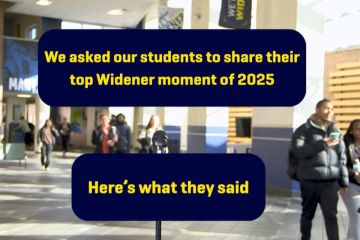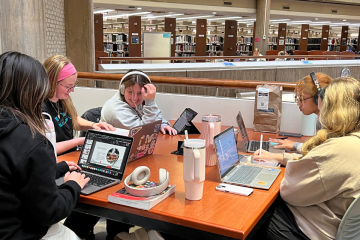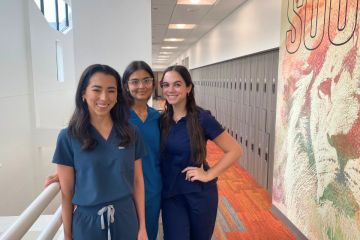Ahead of Election, Faculty Share Expertise to Inform Campus

Ahead of the highly anticipated 2020 presidential election, Widener faculty led strategic efforts to inform members of the university community about voting procedures, and encourage participation and engagement.
For freshman and first-time voter Kyle Meier, the resources gave him an opportunity to not only determine who to cast a ballot for, but to understand the history and importance of the election process.
“It is important that we know U.S. voting procedures so that we’re aware of what is being done with our ballot after we cast it,” said Meier. “The president is arguably the most powerful figure in the world, and we elect that person as U.S. citizens so I think it is beneficial that we’re aware of how that process is done.”
A conversation on voting procedure was led by James Vike, professor of political science and an expert in elections and voter engagement, who opened his classroom discussion on the Electoral College to all students, faculty, and staff.
“I remember back in the 2000 election… most people didn’t know what the Electoral College was,” said Vike. “We’ve focused on it a great deal more over the last 20 years so people are starting to know a little bit more about it now.”
The discussion was part of a series of comprehensive election programming hosted by the Political Engagement Committee in the weeks leading up to Nov. 3. The events, which included debate watches and voter registration efforts, were designed to promote civil discourse and educate the campus community about the nation’s most fundamental exercise.
The interactive conversation investigated the constitutional procedure and its impact on today’s presidential elections.
Origins of the Electoral College
In the summer of 1787, delegates of the Constitutional Convention arrived in Philadelphia to create a framework for how to govern the newly established democratic republic. On the docket was the formation of the executive branch and the process through which leaders of the branch would be chosen.
“At the time of the constitution convention there was a great deal of concern about who would ultimately hold the source of power, so the Electoral College appears as a compromise that accommodates those that are concerned with the election being determined by large populations,” said Vike.
Outlined in article II, section I of the constitution, the Electoral College was established as the system through which the president and vice president are elected to office. Its body consists of 538 electors which represent each state’s total number of Congressional Senators and Representatives, as well as three electors allotted to Washington D.C. A candidate must capture the majority of the college, or 270 electoral votes, to win the presidency.
According to Vike, the college’s intermediary design “highlights on one level the concern that the framers had for the masses which they called the ‘tyranny of the majority.’”
Each state has the authority to determine the rules and procedures for how electors are chosen and how they can vote. In most states, electors cast their votes for the candidate that wins the popular vote in their respective state.
Modifications over the years, including the 12th and 23rd Amendments, shaped the system that is in use today. Over the course of the nation’s history there have been five presidential elections in which the winning candidate won the Electoral College but lost the popular vote.
The Next Generation of Voters
Election-related presentations and meaningful discussions led by Vike and other faculty displayed Widener’s culture of civic engagement and enabled voting members of the Pride, like Meier, to appreciate the significance and value of their ballots.
“As a voter, I think this discussion was helpful because personally I learned more about how our president is decided,” said Meier.
Meier, who voted by mail, believes it is up to young voters to not only exercise their right to vote, but make the effort to understand their civic duty and their democratic responsibility.
“Voting is arguably the most important thing we can do as citizens when it comes to making change and having our voices heard and it’s something that every registered person should do,” said Meier.



